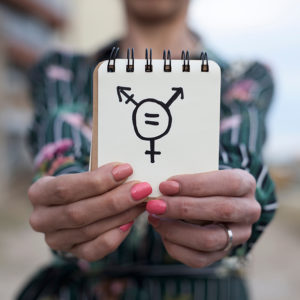Editor’s Note: For an alternative viewpoint, please see Counterpoint: With ‘Gender X,’ New York Wages War on Reality in Birth Certificates
I’ll never forget the day my new driver’s license came with a shiny “F” in the gender field. I opened it, crying with joy, and danced around the bedroom of my tiny basement apartment. I was so sweaty from my bike ride home in the Virginia heat that I got the papers wet as I tore them out of the envelope. It was the first time I’d held an official document that reflected my transition.
But I’ll also never forget the next time I tried to buy a bottle of rum.
The attendant insisted that the “F” gender marker on my license was evidence that my ID was fake. Even after I tried explaining the deeply personal details of my medical history — I was a trans woman at the beginning of my transition — he refused to sell me alcohol.
Nobody doubted I was of age. So I can’t help but wonder: Why did the gender marker need to be there at all? What business does the government have with my gender or my sex?
A handful of states and the District of Columbia have made life a lot easier for some trans and gender-nonconforming people by allowing them to change their gender and/or sex markers on official documents at will. And some of these institutions allow people to select an “X” option in lieu of an “M” or “F.”
On the face of it, this is pretty good. Trans, non-binary, and gender-nonconforming (or GNC) people do, in fact, exist. Policies that recognize their cultural, historic and scientific realities — and make our documents more accurate — often keep us safer.
With laws like this, a trans woman like me doesn’t need to explain away an “M” marker to a prospective employer, renter or bartender. This is a big deal, because trans people can still be legally denied employment, housing and access to spaces of public accommodation in more than half of U.S. states. Make no mistake, these laws are definitely good when they protect the agency, privacy and safety of trans and GNC people.
But they can also put a target on our backs. In addition to my trouble buying rum, I’ve had officers of the law and bartenders alike use the marker on my IDs to belittle me in public and question the legal authenticity of my name. Those who choose an X marker could face similar humiliation and discrimination from those who refuse to understand non-binary identities.
These painful interactions are completely unnecessary. Our photos, names and dates of birth all serve to confirm or deny our identity more than sufficiently.
My doctor sometimes needs to be informed about my medical history and the ways it intersects with my gender, but does my employer? Does my landlord? What about the bartender or the police officer? When was the last time someone asked you about the gender on your driver’s license instead of just looking at you?
I celebrated getting the gender marker changed on my driver’s license, birth certificate, passport and Social Security card. It’s nice to have the state validate my identity. But it also hasn’t changed anything about the way I move through the world. It hasn’t made going through TSA, or doing anything else as a trans person, any easier.
The government doesn’t use this information for much, so why do they need it to begin with? Doctors can assess necessary details around a person’s sex and medical history by talking to their patients and examining them as appropriate, and most law enforcement doesn’t actually pay attention to ID documents in assigning people to gendered facilities.
Just about the only party who does seem to care about what marker is on a driver’s license is auto insurance companies, who use the information to overcharge young men and older women for auto insurance.
In the end, an “X” option can be both relieving and safer for some trans and GNC people. It can make them feel seen and recognized, reduce administrative confusion and even keep people out of harm’s way. But making a tri-nary out of a binary is hardly a solution. The government doesn’t need to know my gender, and neither does my bartender or landlord.
If we want a real solution that makes everyone safer, let’s cut the paperwork and just get rid of the thing.

